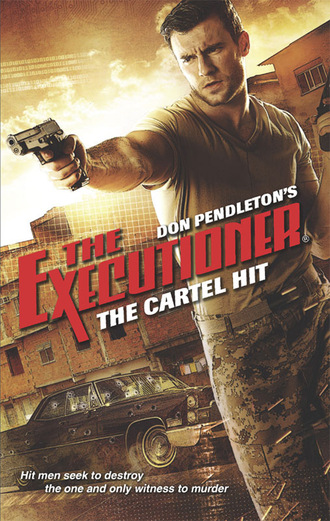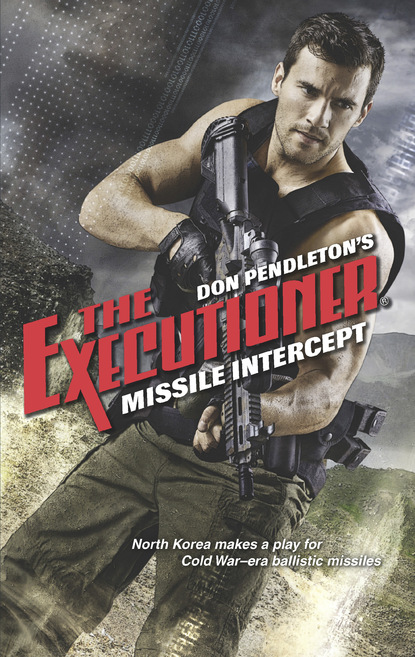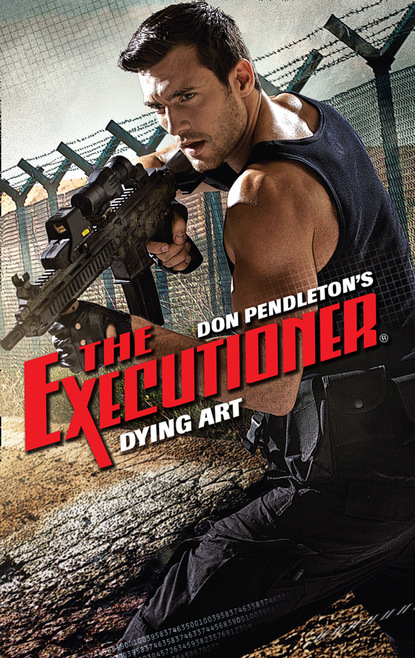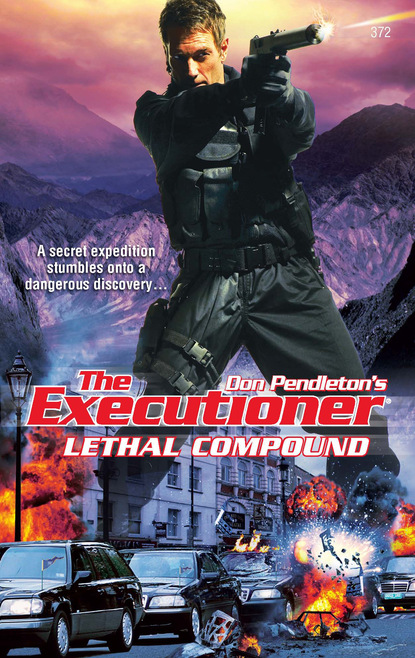
Полная версия
The Cartel Hit
The passenger door of the waiting car opened and an armed figure stepped out. Someone yelled for him to keep coming.
The unknown vehicle was still closing in. As it swerved across the street, automatic weapons began firing. The heavy bursts sent streams of slugs that peppered the waiting SUV and punctured the bodywork, shattering windows. The man who had stepped out of the car went down first; the driver was hit while he was still behind the wheel. Escobedo caught a brief glimpse of a bloodied face behind the windshield. The rattle of automatic fire followed him as he raced for the cover of the SUV. He had barely cleared it when a dull thud was followed by a burst of fire blossoming from the interior. He felt the heat as he swerved away from the vehicle, almost going down. The ball of flame swelled out from the car, flames curling from the bullet-shattered windows.
Escobedo saw a dark alley between two buildings and dashed into it, hiding among the shadows as he negotiated the trash-strewn pavement. When he reached a turn, he followed it and simply kept running, clutching his backpack when it slid from his shoulder.
His chest burning, Escobedo wove his way between buildings, not once looking back. He had no idea where he was going; he was just attempting to gain some distance from the shooters. He twisted around corners, ignoring the shouts of alarm as he pushed by the few people he encountered. He made no attempt to speak to them, because now he couldn’t be sure who to trust.
So he trusted no one.
He was in a race for his life.
Until, exhausted, he was forced to halt. He leaned against a wall, staring around him. Struggling to breathe. Not even sure what part of town he was in. At the mouth of the alley he saw silent, dark storefronts. A deserted street. He heard distant traffic sounds. It took a few moments for him to figure out he was in a part of Broken Tree he seldom visited. Escobedo peered out from behind the building on his left and saw the lighted frontage of the bus depot a few blocks away.
The bus depot.
Could it be the answer to his problem?
Contacting the Justice Department had not worked for him. Escobedo needed another option, and he needed time to think. To plan how he was going to make this thing work. And to do that, he needed to get away from Broken Tree.
He couldn’t erase what he’d seen in Jessup’s barn. Despite the position he had put himself in, he knew he had to follow this through. Seb Jessup had committed murder. Escobedo had witnessed it. Recorded the very act. And his conscience would not allow him to walk away. Jessup had to pay for the brutal crime.
Escobedo also knew he was a marked man. Jessup could not afford to let the matter lie, and he was wealthy enough to pay for Escobedo’s capture. His people would search for him. If Jessup got his hands on Escobedo, he’d suffer the same fate as the couple in the barn—or worse.
And then there were the two agents sent to protect him. Two more murders Escobedo had witnessed, two more dead under his watch.
He needed to get far away. Distance would grant him the time to work out what to do.
Escobedo focused on the bus depot lights again.
He would leave Broken Tree, take a coach across the border.
Into Mexico.
Back to the village where he had come from. Back home.
To Ascensión.

1
“You really believe I’m going to let that cockroach give me up to the cops?” Seb Jessup said. “I will bury that bastard and his evidence.”
Three of his crew members sat in the plush office. Not one of them made any comment. They might have been thinking his outburst was more than a little risky, given that he was already under the close eye of federal authorities who were just waiting for him to step across the line.
But that was Seb Jessup.
A man who had total contempt for the law, society and anyone who dared to cross him. Jessup had a personal mantra: “I go where I want and I do what I want. Get in my way and I will crush you.”
Simple and direct. Jessup believed in being up front with people. They got what they saw. He made no concessions to anyone or anything.
He was in his midthirties, a hard-bodied man who ruled his criminal organization by brute force and cunning. He had a financially successful association with a Mexican cartel over the border, and he traded in weapons and stolen cars. He also had a thriving business in human trafficking. He had no interest in corporate crime. Not for Jessup the sleight of hand in the white-collar world. He was a hands-on racketeer. Jessup liked money. Lots of it. And his territory, which still clung to the well-defined individualism of West Texas, was large enough to accommodate his appetites.
Jessup was entirely a self-made man, and he considered himself a product of his environment. Brought up on a hardscrabble farm, where his family had struggled daily to stay fed, Jessup learned early that a man got what he did only by hard work and grabbing any opportunity that presented itself. He’d made a vow that he would not end up like his folks, worn to a frazzle as they struggled to maintain some kind of life. The land they lived on was hard. The crops they grew were sparse and tended to die off if you turned your back on them.
Jessup’s father was a strong man physically, but less so mentally. Each time he had a setback he would resort to the bottle, becoming surly and downright vicious. The rest of the family was often on the receiving end of Anson Jessup’s hard fists. That went on until Seb’s eighteenth birthday. Tired of being knocked around like a straw-filled dummy, he’d decided to fight back. He drove his bullying father to the ground, his solid fists leaving the man bloody and beaten. For the first time in his life, Jessup’s simmering rage gave him the strength to overcome someone. It would not be the last time that happened.
It was his last day as part of the family. After putting his father down, he went inside the house, packed his few belongings in a bag and walked away. He never looked back.
He spent the next five years in the army. For a boy who had spent long days working the hostile land on a dirt-poor farm, army life was easy. All he had to do was follow orders, and he was given three meals a day, a bed to sleep in and a wage. When he heard other recruits grumbling about the hard life, Jessup had grinned. They knew nothing. He’d kept his head down. He was a quick learner, and he quickly gained promotion. The day he was made corporal was something he was quietly proud of.
He was eventually shipped off to the Middle East and saw a side to life he’d never even thought about back in West Texas. He witnessed killing and destruction. Experienced his first action and found himself facing the possibility of his own death. His training kicked in and he accepted that he either put it to good use or he was going to die right there and then in the midst of the dust and flies and the rattle of gunfire. He was promoted to sergeant.
He met Cole Hatton while he was in the war zone. They clicked from day one. And when the chance arose, they teamed up in a partnership that would follow into civilian life. By the time they were sent back stateside, Jessup and Hatton were considerably wealthier than when they’d first put on uniforms. The army was bringing in vast stores of goods to keep the American forces fed, clothed and armed. It was to be expected that some of those supplies would be diverted. Jessup found a way by bringing in one of the civilian contractors the military was using. Siphoned-off materials were flown back to the States, using the contract aircraft that were coming and going on an almost daily basis. Jessup started small, not wanting to attract attention, and that, coupled with the money he was pulling in from deals with the locals for food and clothing, all added to his growing cash balance.
While Jessup provided the brains, Hatton became the partnership’s muscle and backup. He handled any problems that might interfere with the operations. He did it well. He was direct and dedicated, with a persuasive manner that told anyone getting in the way that it would be extremely advisable to step aside.
They set themselves up back home, building their criminal business with a dedication that would have been the envy of any hardworking entrepreneur. They operated out of a midsize community called Broken Tree, in cattle country. It was a tough town in tough borderlands.
Nine years down the road and they were established as the major player in the region. Jessup had connections across the board. He’d bought and paid for influence in high circles. He ran his organization with a hard hand and took no crap from anyone. His name opened doors, his wealth bought him the rest.
He had his world by the balls. Saw himself as untouchable. Out of reach. A big man in a big piece of country.
One of his most lucrative ventures involved bringing illegal immigrants across the border. Mexico provided plenty of people who were eager to enter the US, lured by the promise of work and money. The promises came true, though they weren’t as clear-cut as the immigrants had been led to believe. Money, yes, but the expenses incurred when they were brought to America were taken from their paychecks. If they protested, they could be exposed to the authorities. That could mean jail, or being sent back to Mexico. There were times when Jessup’s enforcers would hand out physical persuasion. The Mexican laborers were just another product, as far as Jessup was concerned. He bought and sold them. Had the power to make them disappear if the notion came to him. There were plenty of lonely and desolate places in border country where bodies could be, and were, made to vanish.
Jessup believed his most recent enterprise would prove to be even more lucrative. He’d met with Ramon Mariposa, the jefe of A La Muerte, an offshoot of the Sinaloa drug cartel. Ramon Mariposa was looking for a US distributor and Jessup had been interested in growing his presence in the drug trade.
Mariposa had learned Jessup was a solid, well-organized man who ran a thriving business, and the jefe also needed a steady supplier of weapons. The drug cartels were in a violent, ongoing war with competitors and Mexican law enforcement. In a brutal business, A La Muerte was way ahead of its rivals. Mariposa operated with total, unflinching violence. He saw no reason to do otherwise. His need for a reliable supply of quality ordnance was something Seb Jessup could manage easily.
In the end, it was a marriage of convenience. A two-way street. Mariposa and Jessup’s relationship was beneficial to both, workable and problem free.
Until Hermano Escobedo started to rock the boat.
Rocked it with such ferocity that Jessup, for the first time since he’d faced combat, experienced fear.
He maintained his cool in front of his people, while inwardly feeling sick. Not because he was about to cave in under the threat posed by Escobedo, but because he realized for all his power, influence and wealth, he was still vulnerable. Jessup might have been resistant to threats against his security, yet he saw the shadowy possibility that his empire could be badly damaged—even brought down—by the young Mexican. Escobedo was the unexpected threat, the one coming out of left field. And he just might be capable of knocking Jessup off his throne.
Hermano Escobedo obviously felt he had justification, a good reason to strike out. Otherwise, he wouldn’t have placed himself in the firing line. In truth, Jessup could even sympathize with the young man’s motivation. But he still had to stop him.
If Escobedo brought his evidence into the light, Jessup could face life in prison—or even execution. He understood the penalties, and despite his position of power, realized he might conceivably pay the price.
He was going to have to play this one carefully. Hatton had broached the subject, pointing out that Jessup needed to keep his distance. No hands-on punishment this time—which pissed Jessup off. He had always been a hands-on participant. But his partner was insisting he lie low.
“We do this smart,” Hatton said now. “Pull in outside help, give them the details and turn them loose.”
“Not our boys?” Jessup asked.
“Nope. We stay clear. I talk to them, they keep me informed. We fund this with cash. Nothing written down, no computers—only disposable phones. Seb, we can pull this off. Take the bastard down and wipe out the evidence. With nothing to hang on you, the law is going to be pissing in the wind.”
“Trouble with wind, Cole, is that it can change direction.”
Hatton shook his head, a grin on his lips. “You were the only grunt who could make a joke with bullets flying over your head,” he said.
“What can I say, buddy?”
Hatton levered his rangy frame out of his chair, pulling his phone from his pocket. He held it up as he walked to the door. “Today’s burner,” he said. “I’ll make the call. Bring Candy in for a head-to-head. We’ll get him on the case and set him loose on Escobedo.”
“You figure that chili popper is going to make trouble, boss?” one of the remaining two crew members asked.
“He’s going to try,” Jessup said.
The other man said, “If Cole sets Candy on his ass, that boy isn’t going to have another minute of peace. Hell, Seb, you recall when Candy went after that sucker down Nueces way? He had that done and dusted in a couple of days. No one ever found that feller’s body.”
“That’s the way I want it with Escobedo,” Jessup said. “Gone.”
* * *
HATTON STOOD ON the wide porch fronting the big house, speaking into his cell.
“I want you to drop everything, Candy. This is important. Wouldn’t offer it to anyone else. You sort this out for Seb and it’ll be the best payday you ever had.”
“He got himself in a bind?” Candy asked. His voice was low and slow, a homegrown Texas roll.
“Sort of. Candy, this needs clearing real fast. No mistakes.”
“Kind that needs a shovel to finish it?”
“That kind. Dead, buried, forgotten.”
“My specialty.”
“The Meat Wagon in an hour. Okay?”
“Fine,” Candy said, and hung up.
The Meat Wagon was a diner on the west side of Broken Tree that had been there for more than twenty-five years. The aluminum siding had weathered, the metal dull and pitted, but the painted sign had been refurbished recently. The original owner, Hoyt Dembrow, had died a few years back and the diner was managed by his son, Hoyt Dembrow Jr. Junior was over fifty and looked it, so the youthful title didn’t do him any favors. The man liked the food he served in the diner, sampled it every day. His ample size showed that.
As Hatton stepped inside an hour later, the familiar smells of coffee and fried food hit him. He liked that. The Meat Wagon was a piece of stability in a rapidly changing world. It had no offshoot truck franchise, no menu with fancy food catering to dietary needs. It served American food, period, and that was the way Hatton liked it.
He spotted Candy at the back end of the diner, facing him over a raised mug of coffee. At this time of day there were only a few other customers, and Candy had picked the table farthest away, leaving an empty stretch between him and the other eaters. Hatton’s boot heels clicked on the metal floor as he made his way over, stopping to speak to the owner en route.
“Hello, Junior. Coffee?”
“Sure enough, Cole.”
Hatton took the offered cup and joined Candy, dropping his cowboy hat on the table beside him. Candy watched, not saying anything, as he pulled a thick envelope from his jacket and slid it across the table. Candy picked it up and lifted the flap, flipped through the thick wad of bills inside and nodded briefly.
“Down payment,” Hatton said. “Usual terms.”
“You paying for the food, as well?” he asked.
“Don’t I always?”
Candy’s lean, weathered face showed a thin smile. He was a six-foot-three whip of a man who dressed like an out-of-work line rider. He raised his hand and summoned the waitress, ordering a big steak with all the trimmings. Hatton went for his weakness: a stack of pancakes with syrup, bacon and a couple eggs on top. While they waited, Hatton pulled out some photos and showed them to Candy.
“Hermano Escobedo. Son of a bitch is ready to drop the hammer on Jessup. He has evidence that could see Jessup locked up for the rest of his life. Or worse.”
“And Seb, naturally, don’t sit comfortable with that.”
Hatton handed over a folded sheet of paper. “Everything we have on the guy,” he said. “Ain’t much. He came over the border a few years back. He’s legal. Set himself up doing all kinds of hands-on work. We took him on account of he’s got a green thumb and does a tidy job. You know how Seb likes his place looking homey.”
Candy drained his coffee and signaled for a refill. “Jessup want his body delivered—or just vanished?”
Hatton let the question hang for a few seconds.
“Hell, Candy, what would we do with a body messing up the place?”
“Just needed to clarify the situation.”
“Well, it ain’t hard. Find him. Put him out of his misery. Bury him in the desert and keep the shovel for a souvenir.”
Candy smiled. “Hey, why’d you not say it was easy as that?”
Hatton made no comment. He knew the way Candy operated. He might make light of the deal in conversation, but in reality he was a professional who made people disappear. He gave off the impression of being a good old country boy, when he was, in fact, one of the most coldhearted men Hatton had ever come across. Candy took pride in his line of work, employed the very best and never, ever walked away without completing a contract.
They fell into light conversation until their food arrived. Eating became the most important consideration after that, neither man saying very much until they were done.
“When you catch this son of a bitch you need to look for his cell phone. He filmed Jessup. If the law lays its hands on it…”
“I get it,” Candy said. “Don’t you fret. It’s as good as done.”
“You know how to contact me if you need to,” Hatton said. He finished his third coffee, pushed his plate aside and stood up. “While we were deciding how to deal with this, I set a couple of our boys on the job.”
“That’s fine,” Candy said. “Give me the word if they find anything.”
Конец ознакомительного фрагмента.
Текст предоставлен ООО «ЛитРес».
Прочитайте эту книгу целиком, купив полную легальную версию на ЛитРес.
Безопасно оплатить книгу можно банковской картой Visa, MasterCard, Maestro, со счета мобильного телефона, с платежного терминала, в салоне МТС или Связной, через PayPal, WebMoney, Яндекс.Деньги, QIWI Кошелек, бонусными картами или другим удобным Вам способом.












